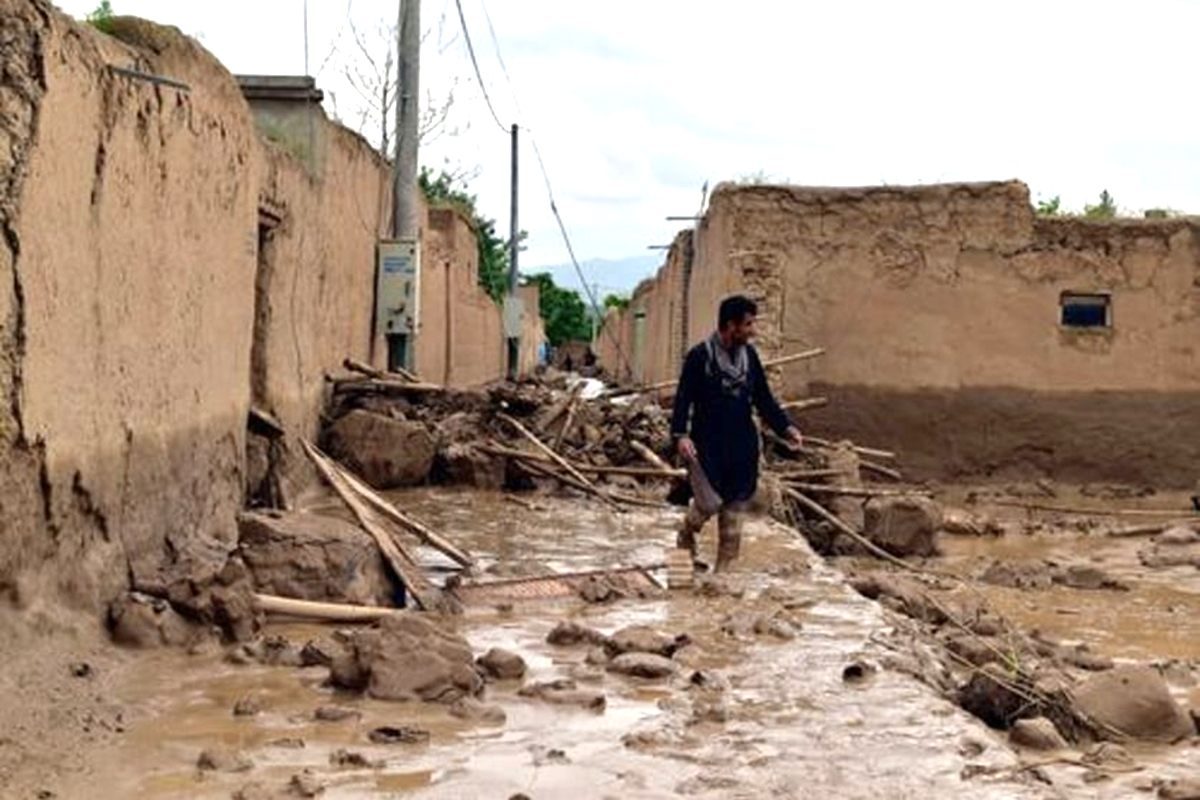
 |
|
Caption: People are seen near to their damaged homes after heavy flooding in Baghlan province in northern Afghanistan on Saturday. |
SITUATION OVERVIEW
Unusually heavy seasonal rains in Afghanistan have triggered flash floods, resulting in significant loss of life and widespread destruction. According to the U.N. food agency, flash floods caused by heavy rains have devastated villages in northern Afghanistan over 300 people have been reported dead, and more than 1,000 houses have been destroyed as a result of the flooding. The floods have primarily affected the northern province of Baghlan and neighboring Takhar province, where casualties and damage have been particularly severe.
The World Food Program (WFP) has initiated emergency relief efforts, distributing fortified biscuits to survivors in the affected regions. However, challenges persist due to the scale and intensity of the disaster. Local media outlets report ongoing search and rescue operations, with communities grappling to locate missing individuals and cope with the aftermath of the floods. Videos circulated on social media depict heart-wrenching scenes of families searching for loved ones amidst the devastation.
 |
|
A man walks near his damaged home after heavy flooding in Baghlan province in northern Afghanistan on Saturday. |
The recent floods compound Afghanistan's vulnerability to climate-related disasters, further exacerbating the country's humanitarian crisis. Afghanistan has experienced a series of floods in the past two months, affecting nearly 13,000 people. The situation highlights the urgent need for both immediate assistance and long-term planning to address the country's susceptibility to extreme weather events.
Richard Bennett, the U.N. special rapporteur on human rights in Afghanistan, emphasizes the critical importance of immediate aid and long-term resilience-building efforts. He underscores the need for concerted action by both the Taliban government and the international community to address the ongoing crisis and mitigate future risks. Increased funding and support are essential to bolstering Afghanistan's capacity to respond to climate-related disasters and protect vulnerable communities.
As Afghanistan grapples with the aftermath of devastating floods, urgent humanitarian assistance is imperative to save lives and alleviate suffering. The international community must prioritize support for Afghanistan's disaster response efforts and invest in long-term resilience-building initiatives to mitigate the impact of future climate-related disasters. Coordination and collaboration among stakeholders are crucial to ensuring an effective and comprehensive response to the ongoing crisis.
Emergency Needs
In the wake of the recent floods in Afghanistan, urgent assistance is needed to address the extensive damage and pressing needs of affected communities. The flooding has caused significant destruction to homes and infrastructure, leaving many without shelter. Immediate relief efforts must prioritize the provision of essential supplies such as food, clean water, and medical aid to alleviate the humanitarian crisis.
While the resilience of the affected communities is commendable and will undoubtedly contribute to the recovery process, external support is essential for a swift and effective response. Local NGOs and grassroots movements have mobilized their efforts to assist on the ground. For example, the World Health Organization has dispatched urgent medical reinforcements to affected areas and has pledged additional aid. However, there is still a critical need for support to address the ongoing challenges, including:
IBC’s Emergency Response
Since 2021, the International Blue Crescent Relief and Development Foundation (IBC) has been actively meeting the needs of the Afghan community, partnering with local partners in the region following the regime change. Drawing on its vast experience in responding to earthquake emergencies and recovery situations in Turkey, Iran, Pakistan, and Indonesia, IBC has efficiently deployed its emergency response team to Marrakesh and also the recent earthquake in Herat. The team is presently engaged in on-site assessments to pinpoint specific areas in urgent need of response and intervention. IBC focuses on the needs of the remote areas of the North and also the damaged areas from the floods. Priority will be given to food, drinking water, medical and hygiene kits distribution, and tents and blankets. Additionally, IBC is experienced in emergency response in the region and has a team in the field, ensuring swift and effective delivery of assistance to affected communities.
IBC prioritizes addressing the needs of remote regions in the North, particularly areas affected by floods. Our immediate focus includes the distribution of essential items such as food, drinking water, medical supplies, hygiene kits, as well as tents and blankets to support affected communities.
IBC’s average budget for the emergency response is outlined as follows:
|
Food and water 5.600 PCS For 350 İndividual for 30 days |
52,500.00 CAD |
|
Shelter (70 Tents) |
15,400.00 CAD |
|
Personal salaries 3 Staff for 2 Months |
13,800.00 CAD |
|
Transportation for relief items (Truck rental) |
3,200.00 CAD |
|
Bedding, Trapline or blankets … 350 PCS |
17,000.00 CAD |
|
Total |
97,944.00 CAD |
Uluslararası mavi Hilal Vakfı’nın duruma müdahalesi ve koordinasyonu hakkında sahadan daha fazla bilgi için iletişime geçebilirsiniz:
| Sadullah Devletgeldi Afghanistan Projects Chairmen +90 536 459 30 07 [email protected] |
Heather Sonya Üner Programs and Partnerships Manager +90 544 830 84 17 [email protected] |